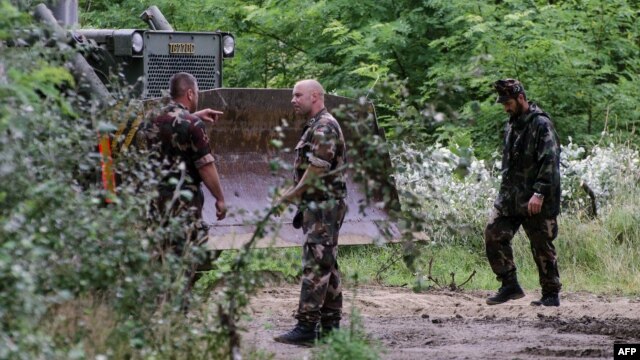Hungary starts building antimigrant fence on Serbian border
| Publisher | Radio Free Europe/Radio Liberty |
| Publication Date | 14 July 2015 |
| Cite as | Radio Free Europe/Radio Liberty, Hungary starts building antimigrant fence on Serbian border, 14 July 2015, available at: https://www.refworld.org/docid/55b5f4808.html [accessed 27 May 2023] |
| Disclaimer | This is not a UNHCR publication. UNHCR is not responsible for, nor does it necessarily endorse, its content. Any views expressed are solely those of the author or publisher and do not necessarily reflect those of UNHCR, the United Nations or its Member States. |
July 14, 2015
 Soldiers of the Hungarian Army's technical unit prepare the first section of a metal fence at the Hungarian-Serbian border near the village of Morahalom on July 13.
Soldiers of the Hungarian Army's technical unit prepare the first section of a metal fence at the Hungarian-Serbian border near the village of Morahalom on July 13.
Hungarian soldiers have begun erecting a controversial fence on the border with Serbia that is aimed at keeping out migrants.
The first fence section is being built on the outskirts of Morahalom, 180 kilometers south of Budapest, the government said.
Lawmakers last week approved the construction of the 4-meter high barrier along the 175-kilometer border with Serbia, which is not a European Union member.
Hungary is in the EU's passport-free Schengen zone, which means that once migrants are inside the country, they can travel freely within the EU.
So far in 2015, Hungarian authorities have registered 78,190 migrants crossing the border illegally, about 77,600 of whom have entered from Serbia.
Most of the migrants, including children who hike for weeks trying to cross Macedonia and Serbia, are from the war-torn countries of Afghanistan, Iraq, Syria, and Kosovo.
Amnesty International has called the treatment of migrants by Balkans countries "shameful."
The fence, announced last month by populist Prime Minister Viktor Orban, triggered concern both in Serbia and the EU.
Based on reporting by AFP, Reuters, dpa, and AP
Link to original story on RFE/RL website
